Blow Your Own Horn may refer to:
- A 1983 album by Herb Alpert
- Blow Your Own Horn (film), a 1923 film
Blow Your Own Horn may refer to:

A shofar is an ancient musical horn typically made of a ram's horn, used for Jewish religious purposes. Like the modern bugle, the shofar lacks pitch-altering devices, with all pitch control done by varying the player's embouchure. The shofar is blown in synagogue services on Rosh Hashanah and at the end of Yom Kippur; it is also blown every weekday morning in the month of Elul running up to Rosh Hashanah. Shofars come in a variety of sizes and shapes, depending on the choice of animal and level of finish.
Blowout or Blow out may refer to:
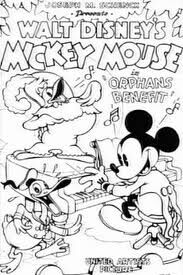
Orphan's Benefit is an American animated short film produced by Walt Disney Productions in black-and-white. It was first released in 1934 and was later remade in Technicolor in 1941 under the corrected title Orphans' Benefit. The cartoon features Mickey Mouse and his friends putting on a vaudeville-style benefit show for a group of unruly orphans. It contains a number of firsts for Disney, including the first time in which Mickey Mouse and Donald Duck appear together, and was the 68th Mickey Mouse short film to be released, and the sixth of that year. It was also the cartoon which had the first story to be written that featured Donald Duck, though it was the second Donald Duck short to be produced and released, after The Wise Little Hen.

The Horny Horns were a horn section associated with Parliament-Funkadelic and Bootsy's Rubber Band led by trombonist Fred Wesley. The group also featured saxophonist Maceo Parker and Rick Gardner and Richard "Kush" Griffith on trumpets.

Come Blow Your Horn is Neil Simon's first play, which premiered on Broadway in 1961 and had a London production in 1962 at the Prince of Wales Theatre. Simon rewrote the script more than two dozen times over several years, resulting in a hit premiere that allowed Simon to leave his full-time television writing career to write stage and film scripts.
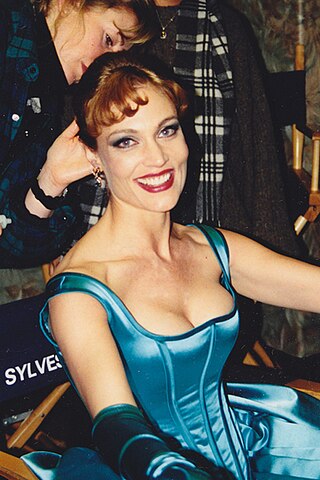
Daphne Lee Ashbrook is an American actress best known for playing Grace Holloway in Doctor Who: The Movie, Melora Pazlar in Star Trek: Deep Space Nine, Jackie Kowalski in Hollywood Heights, and Dawn Atwood in The OC.
"The Elfin Knight" is a traditional Scottish folk ballad of which there are many versions, all dealing with supernatural occurrences, and the commission to perform impossible tasks. The ballad has been collected in different parts of England, Scotland, Ireland, the US, and Canada. As is the case with most traditional folk songs, there have been countless completely different versions recorded of the same ballad. The first broadside version was printed before 1674, and the roots of the song may be considerably older.

"I've Been Working on the Railroad" is an American folk song. The first published version appeared as "Levee Song" in Carmina Princetonia, a book of Princeton University songs published in 1894. The earliest known recording is by The Shannon Quartet, released by Victor Records in 1923.

The Horn Blows at Midnight is a 1945 comedy fantasy film directed by Raoul Walsh, and starring Jack Benny.
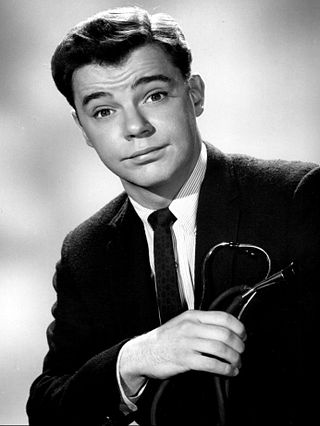
Warren Berlinger was an American character actor, with Broadway runs, movie and television credits, and much work in commercials.

"Didn't I (Blow Your Mind This Time)" is a song by American soul group the Delfonics, co-written by producer Thom Bell and lead singer William Hart. It was released as a single in 1969 on the Philly Groove record label and appeared on their self-titled third album the following year. The song reached number three on the Billboard R&B chart and number ten on the Billboard Hot 100 in 1970. Overseas, the song peaked at number 22 on the UK Singles Chart in and number 81 in Australia. The Delfonics won a Grammy Award for Best R&B Vocal Performance by a Duo or Group for the song in 1971.
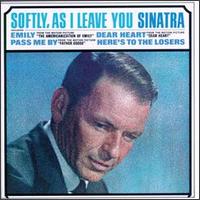
Softly, as I Leave You is a 1964 studio album by American singer Frank Sinatra. Arranged by Ernie Freeman, several tracks such as "Softly, as I Leave You", "Then Suddenly Love" and "Available" departed from Sinatra's signature vocal jazz style by flirting with a more contemporary pop sound. The rest of the album is pieced together with leftovers from various early-'60s sessions, from many different arrangers and conductors.
James Ronald Horn is an American saxophonist, woodwind player, and session musician.
Joyce Nizzari is an American model, dancer, and actress. She was Playboy magazine's Playmate of the Month for its December 1958 issue. Her centerfold was photographed by Bunny Yeager. She was born in The Bronx, New York and is of Italian descent.
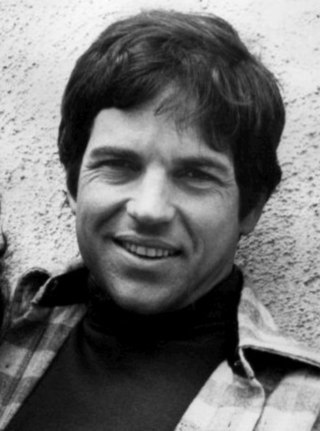
Gerard Anthony Bill is an American actor, producer, and director. He produced the 1973 movie The Sting, for which he shared the Academy Award for Best Picture with Michael Phillips and Julia Phillips. As an actor, Bill had supporting roles in Come Blow Your Horn (1963), Shampoo (1975), Pee-wee's Big Adventure (1985), and Less than Zero (1987). He made his directorial debut with My Bodyguard (1980) and directed movies Six Weeks (1982), Five Corners (1987), Crazy People (1990), Untamed Heart (1993), and Flyboys (2006).
In music, the term slap tonguing refers to a musician playing a single-reed instrument such as a clarinet or a saxophone employing a technique to produce a popping sound along with the note.

"Blow Your Mind" is the third overall single to be released from British funk/acid jazz band Jamiroquai's debut studio album, Emergency on Planet Earth (1993). It was released on 24 May 1993 through Sony Soho Square in the United Kingdom, peaking at number 12 on the UK Singles Chart. The song was written by frontman Jay Kay with Toby Smith, and produced by Rick Pope. Its accompanying music video was directed by Vaughan Arnell and Anthea Benton.
"Sticks and Stones" is an English-language children's rhyme. The rhyme is used as a defense against name-calling and verbal bullying, intended to increase resiliency, avoid physical retaliation, and/or to remain calm and indifferent. The full rhyme is usually a variant of:
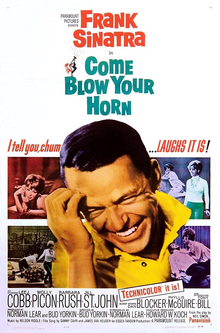
Come Blow Your Horn is a 1963 American comedy film directed by Bud Yorkin from a screenplay by Norman Lear, based on the 1961 play of the same name by Neil Simon. The film stars Frank Sinatra, Lee J. Cobb, Molly Picon, Barbara Rush, and Jill St. John.
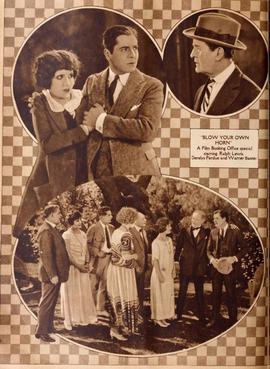
Blow Your Own Horn is a 1923 American silent comedy film directed by James W. Horne and starring Warner Baxter, Ralph Lewis, and Derelys Perdue.